
Dr Frank Lin
Australia’s national pilot program for precision oncology in refractory advanced cancers has found that few patients receive biomarker matched therapies and their survival outcomes are mixed.
Presenting results from the Molecular Screening and Therapeutics (MoST) program, Dr Frank Lin of the University of NSW noted that 37.5% of 3383 genomically screened patients had a biomarker that would match them to an evidence-based therapy.
Subsequently, only 3.4% of patients went on to receive a matched therapy, with possible reasons for the low treatment rates being lack of access to clinical trials or off-label prescribing, he told the Australian Precision Oncology Symposium 2024 (APOS24) held by Omico in Sydney on 8 March.
The MoST program cohort involved 4173 adults patients with rare or refractory cancers who were offered comprehensive genomic profiling to try identify actionable biomarkers.
Profiling identified 1270 patients who had genomically actionable alterations that were matched to therapies with an acceptable level of evidence (either TGA approved, standard of care or with positive phase 2 trial data).
The results showed that 116 of the 3383 patients who had a molecular tumour board report received a matched therapy. This group of patients experienced significantly longer survival compared with 410 patients who received only unmatched therapy (median OS 21.2 v 12.8 months, HR 0.58, 0.45 to 0.76, P<0.001).
A further group of 133 patients received a matched “investigational” therapy (supported by low level evidence or repurposed from another cancer type). This group did not show significant differences in outcomes (median OS 14.5 v unmatched 12.8 months, n=536, HR 0.88, 0.72 to 1.08, p=0.24).
Exploratory analysis showed there were key subgroups of genomic alterations associated with better survival, Dr Lin told the meeting, held at University of NSW.
These included immune checkpoint inhibitor therapy in patients with a high TMB (median OS 19.1 vs 9.7 months for unmatched patients), and patients with loss-of-function in the ARID1A gene.
There were also survival benefits in patients with Switch/Sucrose Non-Fermentable complex mutations who received investigational/repurposed matched therapies (median OS 30.1 v 9.6 months).
Dr Lin said the findings suggested a need for prioritising evidence-based genomically informed therapy in precision oncology programs for patients with refractory solid cancers.
The findings also suggested a need to reconsider the appropriateness of drug repurposing if solely based on biomarker directed findings in a non-cognate cancer type, he added.
“The findings emphasise the importance of evaluating unproven therapies in clinical trials,” he concluded.
The MoST findings were first presented at the ASCO 2023 meeting in Chicago in June 2023 (link here).
ASPIRATION trial on track in lung cancer

Prof Nick Pavlakis (Omico)
Also speaking at the APOS24 meeting, Professor Nick Pavlakis said there had been excellent progress with a subsequent precision oncology study in lung cancer – ASPIRATION – now underway in multiple centres across Australia.
The trial aims to assess the impact of comprehensive genomic profiling in patients with metastatic NSCLC, offering matched therapies beyond the current actionable biomarkers of EGFR and ALK and ROS1 fusion treated with TKIs.
Prof Pavlakis said recruitment to ASPIRATION had been remarkably successful given the restrictions during the COVID pandemic, with 1000 patients now participating at 17 sites across Australia.
The trial had already shown that CGP is feasible at a national level in Australia, with an average turn-around time of 29 days, he told the meeting.
The next step is to report on outcomes such as percentage of patients with actionable alterations, percentage of patients receiving matched treatments and percentage of patients who have treatment changed based on CGP. ASPIRATION will later provide results on clinical outcomes and other secondary outcomes such as healthcare resource use, he added.
The ASPIRATION trial (link here) was developed by Thoracic Oncology Group of Australasia (TOGA) in partnership with Omico Australia and the NHMRC Clinical Trials Centre at the University of Sydney.